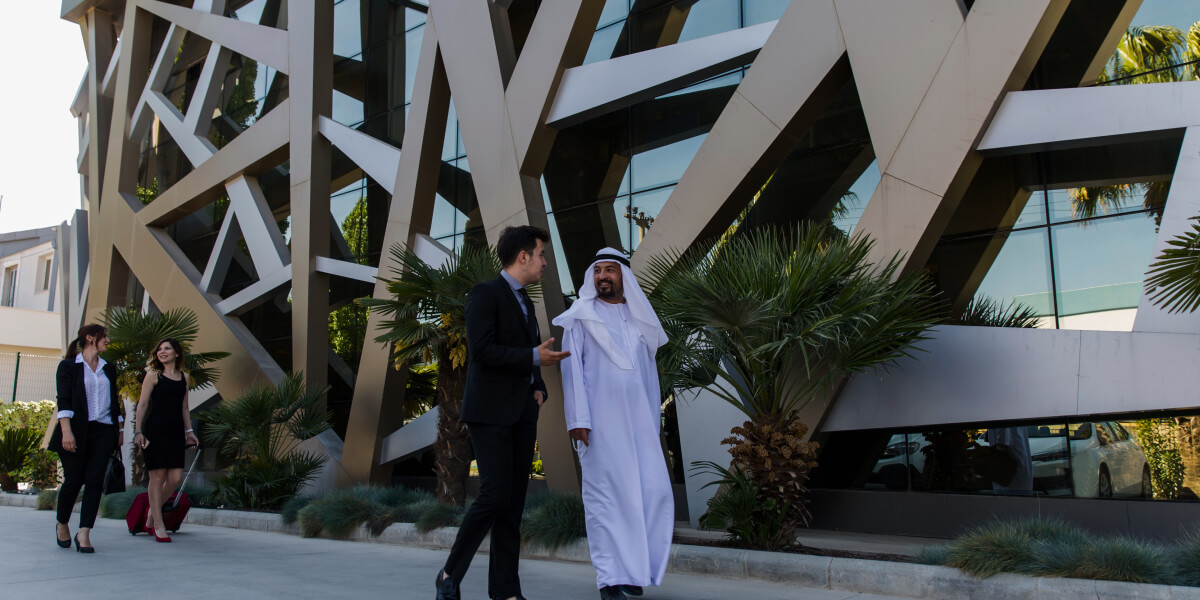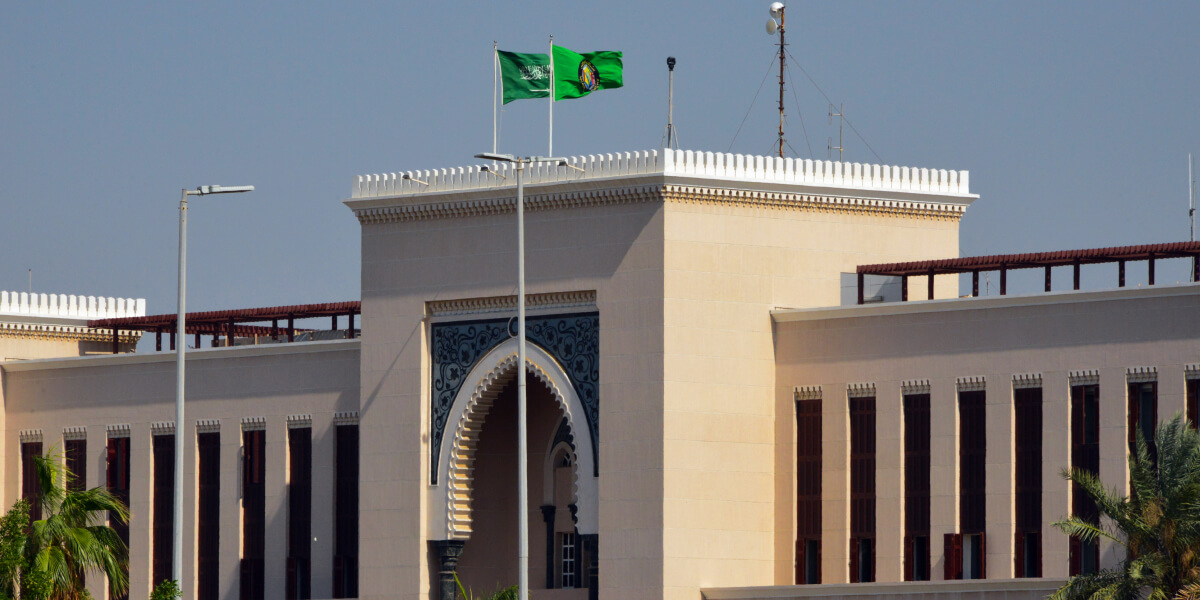
10 Essential Tips for Starting a Business in Saudi Arabia
Saudi Arabia is a premier destination for entrepreneurs seeking long-term growth and success. As the Kingdom works to diversify its economy beyond oil, new opportunities are emerging in sectors like technology, healthcare, and renewable energy.
This transformation offers great potential for foreign investors in one of the world’s most dynamic and business-friendly markets.
Starting a business or investing in Saudi Arabia can be one of the most rewarding decisions for entrepreneurs seeking to expand into the Middle East. The Kingdom’s Vision 2030 drives innovation and economic growth, providing various opportunities across various sectors.
➞ This guide outlines the first key areas that will help you succeed when starting a business in Saudi Arabia.
The Business Environment in Saudi Arabia

Why Saudi Arabia is an Attractive Market for Foreign Investors
▸ Vision 2030: As part of the country's efforts to diversify its economy, Vision 2030 has opened many sectors to foreign investment. This initiative is designed to reduce the Kingdom's dependence on oil and boost industries such as technology, renewable energy, healthcare, and tourism.
▸ Geographical Advantage: Located at the crossroads of three continents, Asia, Europe, and Africa, Saudi Arabia offers unparalleled access to markets in the Middle East and beyond. It's strategically positioned as a trade hub, making it an ideal base for companies looking to expand into the region.
▸ Young Population: With a population of over 35 million, Saudi Arabia boasts a young, educated, and tech-savvy demographic. This population is highly receptive to new products and services, especially in IT and e-commerce, which is rapidly increasing.
▸ Government Support: The Saudi government actively promotes entrepreneurship by offering incentives like tax exemptions, simplified business registration procedures, and the possibility of 100% foreign ownership in many sectors. The government supports businesses through programs like SAGIA, which helps foreign investors navigate the regulatory landscape.
▸ Infrastructure: Saudi Arabia is home to world-class infrastructure, which supports sectors such as logistics, manufacturing, and healthcare. The Kingdom has invested heavily in transportation networks, ports, and telecommunication systems, making business operations easier.
Key Sectors Open to Foreign Investment
As the country continues to diversify its economy, several high-growth sectors are particularly attractive to foreign investors:
| Sector | Key Investment Opportunities |
|---|---|
| Technology | Investments in AI, cybersecurity, IT infrastructure, and digital transformation projects. |
| Healthcare & Biotech | Medical research, hospital development, pharmaceutical manufacturing, and health tech. |
| Renewable Energy | Solar, wind, and green hydrogen projects aimed at meeting Vision 2030’s sustainability goals. |
| Tourism & Hospitality | Hotel development, cultural tourism, and entertainment projects such as theme parks and resorts. |
| Manufacturing & Logistics |
Industrial facilities, logistics hubs, and supply chain solutions to support Saudi Arabia's growing economy.
|
Legal Requirements for Starting a Business in Saudi Arabia

When starting a business in Saudi Arabia, one of the first things you'll need to decide is the business structure. The right choice will depend on your business’s long-term goals and the industry you're entering.
Types of Business Structures for Foreign Entrepreneurs
Foreign investors can choose from the following business structures:
➞ Limited Liability Company (LLC)
-
Popular for small to medium-sized businesses
-
Offers flexibility in management
-
Foreign ownership can be up to 100% in many sectors
-
Requires a local Saudi partner in some cases
➞ Joint Stock Company (JSC)
-
Suitable for larger businesses requiring multiple shareholders
-
Ideal for businesses with large-scale investments
-
Comes with more complex regulatory requirements
➞ Branch Office
-
Operates as an extension of a foreign parent company
-
Can be used for market research or sales
-
Does not require a local partner but is limited to specific activities
➞ Representative Office
-
Primarily for business development and market research
-
Cannot generate revenue directly but helps in building connections with potential clients
The Company Registration Process
Once you've chosen your business structure, you’ll need to go through the registration process. This includes several steps:
- Obtain an Investment License
The first step for foreign investors is to apply for an Investment License through the Ministry of Investment Saudi Arabia (MISA). The process is straightforward and can be completed online.
- Register with the Ministry of Commerce
After obtaining the investment license, you’ll need to register your business and get a Commercial Registration (CR) certificate.
- Open a Corporate Bank Account
To legally conduct business, a local corporate bank account is necessary for receiving payments and managing operational expenses.
- Register for VAT and Zakat
If your business exceeds certain revenue thresholds, you must register with the Zakat, Tax, and Customs Authority (ZATCA) for VAT and Zakat (an Islamic tax). The VAT rate is 15% on most goods and services.
Necessary Licenses and Permits
In addition to the general registration process, certain industries require additional permits or licenses. The specific licenses depend on the type of business you are starting:
➞ Healthcare Businesses
-
Must obtain approval from the Saudi Food and Drug Authority (SFDA), the Ministry of Health, and other relevant bodies.
➞ Food Industry
-
Must comply with health and safety regulations.
-
Requires permits from the Saudi Food and Drug Authority and local municipalities.
➞ Education
-
Schools, training institutes, and educational ventures require approval from the Ministry of Education.
➞ Technology and Financial Services
-
Tech and financial businesses may need licenses from:
-
The Saudi Arabian Monetary Authority (SAMA)
-
The Ministry of Communications
-
Visa Requirements for Foreign Entrepreneurs in Saudi Arabia

When planning to start a business in Saudi Arabia, obtaining the right visa is an essential step. The Kingdom offers various visa types depending on your purpose of stay, whether it’s for business meetings, establishing an investment, or working on-site.
How to Apply for a Saudi Arabian Visa
The Kingdom offers several visa options, including business, investor, and work visas:
▸ Business Visa
-
For short-term visits to meet potential clients, partners, or government officials
-
Typically valid for up to 90 days
-
Can be issued for multiple entries
▸ Investor Visa
-
Required if you plan to establish or manage a business
-
Tied to your investment project
-
Permits residency in Saudi Arabia for the duration of your operations
-
Requires proof of business registration with MISA and other documents
▸ Work Visa
-
Needed if you plan to run daily operations or hire staff
-
Grants permission for ongoing business activity and on-the-ground management
▸ Common Requirements for Visa Applications:
-
Valid passport
-
Business plan (for investor visa)
-
Proof of business registration (CR and MISA License)
-
Financial documents (proof of investment/funding)
Saudi Visit Visa Fees
|
Visa Type |
Cost Range (USD) |
Details |
|---|---|---|
|
Business Visa |
$50 - $200 |
Typically valid for up to 90 days |
|
Investor Visa |
$200 - $500 |
Based on investment size |
|
Work Visa |
$1,000 or more |
Depends on type of work and position offered |
Duration and Validity of a Visit Visa
-
Business Visit Visa: Up to 90 days; can be extended by applying through Saudi authorities
-
Investor Visa: Validity depends on the investment project; typically 1 to 5 years with renewal options
-
Work Visa: Linked to your employment contract; renewable based on job duration or residency status
Saudi Family Visit Visa
If you’re bringing family while running your business in the Kingdom:
-
Eligibility: Spouse, children, and parents are eligible; extended family may need special approvals
-
Application Process: Requires proof of relationship and your legal status in Saudi Arabia (e.g., visa or iqama)
Saudi Business Setup Costs: What to Consider

Starting a business in Saudi Arabia involves several cost components that foreign investors need to plan for. The expenses can vary depending on your business type, scale of operations, and the sector you are entering.
Initial Investment and Setup Costs
Before launching your business, you’ll need to allocate funds for registration, legal paperwork, licenses, and other administrative tasks.
|
Cost Item |
Estimated Cost (SAR) |
Estimated Cost (USD) |
|---|---|---|
|
MISA License Fees |
2,000 SAR |
$533 |
|
Commercial Registration (CR) Fees |
8,100 SAR |
$2,160 |
|
Publication Fees (Articles of Association) |
5,500 SAR |
$1,466 |
|
Notary Fees for Articles of Association |
1,500 SAR |
$400 |
|
Bank Account Setup |
1,000 – 2,000 SAR |
$267 – $533 |
Ongoing Regulatory Costs
In addition to the setup costs, you'll need to account for continuous regulatory expenses:
Zakat and VAT Compliance
-
Businesses with revenue over a specific threshold must register for VAT (15%)
-
Zakat (2.5%) applies to Saudi-owned companies
-
VAT returns must be filed quarterly or annually
Saudization Compliance
-
Under the Nitaqat Program, businesses must hire a minimum quota of Saudi nationals
-
The required percentage varies by sector and company size
Annual License Renewals
-
Commercial Registration and other business licenses must be renewed each year
-
Fees generally range from 3,000 to 5,000 SAR, depending on your industry and business type
Scaling Your Business in Saudi Arabia: Government Support and Initiatives

Saudi Arabia has multiple government-backed organizations that facilitate foreign investment by offering support through incentives, licenses, and regulatory guidance. Here are the key players:
Ministry of Investment Saudi Arabia (MISA)
-
The primary body for foreign investment in the Kingdom
-
Issues investment licenses allowing 100% foreign ownership in many sectors
-
Offers tax exemptions, duty-free import benefits, and financing incentives
SAGIA (Saudi Arabian General Investment Authority)
-
Works alongside MISA to support foreign investors
-
Helps navigate regulations, connect with local partners, and explore sector-specific opportunities
-
Promotes alignment with Vision 2030 goals
Saudi Industrial Development Fund (SIDF)
-
Supports investors in industrial projects
-
Offers low-interest loans and financial support for ventures in manufacturing, infrastructure, and energy
Investment Firms to Fund a Business in Saudi Arabia
Saudi Arabia has a growing network of venture capitalists and investment firms that support emerging businesses:
Saudi Venture Capital Company (SVC)
-
Government-backed VC firm
-
Focuses on seed-stage funding, especially in technology, AI, and digital transformation
Riyadh Valley Investment Company (RVIC)
-
Invests in high-tech, biotech, and sustainability-focused projects
-
Supports businesses aligned with Vision 2030, especially in renewable energy and innovation
Private Equity Firms
-
Alkhabeer Capital and The Saudi Investment Group are active in the private equity space
-
Target scalable startups and high-growth sectors such as healthcare, fintech, and logistics
Angel Investors and Accelerators
-
Platforms like Flat6Labs and Seedstars offer funding, mentorship, and access to startup networks
-
Focus heavily on early-stage businesses in innovation-driven sectors
Saudi Arabia Taxation System

Saudi Arabia offers a relatively straightforward and business-friendly tax system. The Kingdom’s tax policies are designed to encourage investment and business growth while keeping tax rates competitive compared to other countries in the region.
Key Taxes in Saudi Arabia
Corporate Tax
-
Rate: 20% on net profits for most businesses
-
Applies to both local and foreign companies
-
Higher rates (up to 85%) may apply to oil and gas companies
Businesses can carry forward tax losses for up to five years
Zakat
-
Islamic tax applicable to Saudi-owned businesses and those with majority Saudi ownership
-
Calculated at 2.5% of net worth (not profits)
-
Foreign-owned businesses are exempt unless they have Saudi partners or majority Saudi ownership
Value Added Tax (VAT)
-
Introduced in 2018, initially at 5%, increased to 15% in 2020
-
Applied to most goods and services
-
Businesses must register for VAT if revenue exceeds a specific threshold
-
VAT returns are filed quarterly or annually through ZATCA
Withholding Tax
-
Applied to payments made to non-resident foreign entities for certain services
-
Rates:
-
Royalties: 15%
-
Dividends: 5%
-
Interest: 5%
-
Technical service fees:
-
-
May vary depending on international tax treaties
Excise Tax
-
Imposed on products considered harmful to health or the environment
-
Rates:
-
Tobacco products: 100%
-
Sugary drinks: 50%
-
Energy drinks: 100%
-
-
Relevant for businesses in food and beverage or retail sectors
Saudi Arabia Culture: What to Consider

Deep-rooted traditions, Islamic practices, and long-standing social norms influence Saudi Arabia’s business culture. Foreign entrepreneurs must understand and respect these cultural nuances to navigate the business environment successfully.
Key Cultural Considerations
-
Respect for Hierarchy and Authority
Saudi business culture places significant importance on hierarchy. Decision-making is often centralized, and senior leaders hold substantial influence. It's important to recognize and respect the authority of senior executives during meetings and negotiations. -
Personal Relationships
Business is often built on personal trust. Developing relationships before getting into business discussions is common. Meetings may include personal conversations, and networking through mutual contacts is highly valued. -
Patience and Time Management
Business processes may take longer than expected. Meetings may start late or be rescheduled, and decisions can take time. Entrepreneurs should be flexible and patient when navigating local timelines. -
Formality and Professionalism
Business attire is formal. Men usually wear suits; women should dress modestly. Titles like “Mr.” or “Dr.” followed by the surname are commonly used in meetings. Politeness and respectful communication are essential. -
Gender Roles
While gender norms have traditionally been conservative, recent reforms have opened up more roles for women in the workforce. Women are no longer required to cover their heads in business settings but should still dress conservatively.
Practical Steps for Launching Your Business in Saudi Arabia

Starting a business in Saudi Arabia involves several key steps that lay the foundation for success. Whether you are launching a tech startup or expanding into a new sector, careful planning and research are crucial.
Conduct Market Research
Before launching your business, thorough market research is essential to understanding the local demand, competition, and potential challenges.
-
Identify Target Markets
Saudi Arabia has a diverse consumer base with growing demand in sectors like technology, healthcare, tourism, and renewable energy. The population is young and tech-savvy, making it ideal for digital and e-commerce businesses. -
Analyze Local Competitors
Study existing businesses in your niche. Identify key players, pricing strategies, and service gaps. Understanding how others operate in the Saudi market will help you position your business effectively. -
Leverage Local Data and Research
Use official data from the Saudi General Authority for Statistics, SAGIA, and other local research firms. These sources provide insights into consumer behavior, industry trends, and economic indicators. -
Conduct Surveys and Focus Groups
Engage with potential customers directly to validate your business idea. Surveys and interviews can provide feedback on pricing, product design, and service expectations. -
Understand Local Regulations
Make sure you’re aware of industry-specific legal standards, especially in regulated fields like food, healthcare, and construction. Compliance is essential for smooth operations.
Create a Solid Business Plan
A detailed business plan is necessary for securing investors, managing operations, and succeeding in the Saudi market.
-
Executive Summary
A clear overview of your mission, target market, product or service, and financial goals. -
Market Analysis
Based on your research, outline customer profiles, market demand, growth potential, and competition. -
Business Model and Revenue Streams
Describe how your business will generate income—sales, services, subscriptions, etc.—and how it plans to scale. -
Operations and Logistics Plan
Include your office or warehouse location, supply chain, staffing plan, and operational workflow. -
Marketing and Sales Strategy
Define how you will promote your business—digital marketing, advertising, partnerships—and your distribution or sales channels. -
Financial Plan and Projections
Include startup costs, expected revenue, expenses, and profitability forecasts for the next 3 to 5 years.
Find the Right Location for the Business
The location of your business plays a critical role in its success. Saudi Arabia offers a variety of options, from large cities to specialized economic zones. Your choice should be based on your industry, access to clients, operational needs, and talent availability.
Major Business Centers
-
Riyadh
As the capital and largest city, Riyadh is a central hub for government, finance, and corporate headquarters. It's ideal for businesses targeting public sector contracts, large enterprises, and affluent consumers. -
Jeddah
Saudi Arabia’s main port city on the Red Sea, Jeddah is a gateway for trade and tourism. It’s a great base for logistics, hospitality, retail, and maritime sectors. The city's growing expat population also makes it attractive for international businesses. -
Dammam
Located in the oil-rich Eastern Province, Dammam is an industrial and logistics powerhouse. It's well-suited for manufacturing, energy, and supply chain operations. The region has direct access to Bahrain and strong transport links to the rest of the Gulf. -
Khobar
Close to Dammam, Khobar is popular with multinationals and service-based businesses, especially in the energy and consulting sectors. It’s also known for a more cosmopolitan lifestyle.
Economic Zones
Saudi Arabia has established special zones that offer incentives like tax breaks, streamlined regulations, and customs benefits.
-
King Abdullah Economic City (KAEC)
Focuses on manufacturing, logistics, and technology. Offers easy access to seaports and infrastructure tailored to industrial ventures.
Read our blog on KAFD: The Rising Business Capital of Saudi Arabia to discover why this dynamic financial district is becoming the new epicenter for investment and innovation in the Kingdom. -
NEOM
A futuristic mega-project with a focus on sustainability, smart technologies, and global innovation. Ideal for high-tech startups and experimental ventures aligned with Vision 2030.
Access to Talent
-
Riyadh and Jeddah have the largest pool of skilled professionals across finance, tech, and healthcare.
-
Eastern cities like Dammam and Khobar offer engineering and industrial expertise, often at lower labor costs.
Set Up Operations
Once you’ve chosen your location, the next step is to establish your physical and operational presence. This involves both administrative and logistical tasks to ensure your business can function effectively from day one.
Key Steps to Set Up Operations
-
Secure Office or Warehouse Space
Depending on your business model, this could range from a co-working space to a retail storefront or industrial warehouse. Lease agreements in Saudi Arabia typically require a minimum one-year commitment. -
Hire Employees
Begin recruiting local and foreign talent in line with your business needs. Ensure compliance with Saudi labor laws, including Saudization requirements, which mandate hiring a certain percentage of Saudi nationals based on your sector. -
Register with GOSI
If you’re hiring employees, you must register with the General Organization for Social Insurance (GOSI), which handles employee benefits and insurance. -
Establish Local Partnerships
Identify local suppliers, service providers, and potential clients. Building strong business relationships early will help ensure smoother operations and growth. -
Apply for Industry-Specific Licenses
If applicable, complete the paperwork for any specialized permits that your business needs before launch. -
Set Up Utilities and Tech Infrastructure
Arrange for electricity, water, internet, and phone services. Some business parks and zones offer bundled infrastructure support.
Saudi Business Setup for Ultimate Success

Successfully launching your business in Saudi Arabia is only the beginning. To thrive in the Kingdom’s dynamic market, you’ll need to plan for long-term growth, stay compliant, and align with national development goals like Vision 2030.
Strategic Partnerships to Consider
Forming the right partnerships can accelerate your growth, reduce risk, and help you navigate Saudi Arabia’s regulatory and cultural landscape more effectively.
Types of Partnerships to Explore
-
Local Business Partners
In many sectors, partnering with a Saudi entity or individual is essential for meeting Saudization requirements and accessing local networks. Local partners can assist with distribution, customer acquisition, and compliance. -
Government and Private Sector Collaborations
The Saudi government is investing heavily in sectors like energy, healthcare, and technology. Public-private partnerships (PPPs) can provide access to large contracts, funding, and infrastructure. -
Industry Alliances
Team up with businesses that complement your offerings. For example, a logistics company could partner with an e-commerce brand to improve last-mile delivery. These collaborations can create bundled services that benefit both parties. -
International Partnerships
Saudi Arabia’s global ambitions make it an ideal base for cross-border cooperation. Partnering with foreign firms can bring in new technology, expertise, and access to overseas markets.
Staying Aligned with Saudi Vision 2030

Saudi Arabia’s Vision 2030 is not just a government initiative, it’s the foundation for how the country is transforming its economy and society. Aligning your business with Vision 2030 can open up access to government incentives, partnerships, and long-term opportunities.
-
Focus on Innovation and Technology
Vision 2030 prioritizes the digital economy. Businesses that leverage AI, fintech, health tech, or smart infrastructure will find more support and interest from local stakeholders. -
Sustainability and Green Initiatives
Green energy, eco-friendly products, and sustainable manufacturing are all in high demand. If your business contributes to environmental goals, you’ll find easier access to funding and visibility. -
Diversify Revenue Streams
Saudi Arabia is moving away from an oil-dependent economy. The government encourages businesses in tourism, logistics, education, entertainment, and advanced manufacturing. -
Engage in Local Community Development
Social responsibility and community involvement are becoming important in Saudi business culture. Supporting education, employment, and cultural programs can enhance your brand’s local reputation and build trust.
Starting and growing a business in Saudi Arabia offers immense opportunities, especially as the Kingdom continues to evolve under Vision 2030. With its strategic location, economic diversification, and supportive government policies, Saudi Arabia is becoming a prime destination for entrepreneurs looking to expand in the Middle East.
Contents
- The Business Environment in Saudi Arabia
- Legal Requirements for Starting a Business in Saudi Arabia
- Visa Requirements for Foreign Entrepreneurs in Saudi Arabia
- Saudi Business Setup Costs: What to Consider
- Scaling Your Business in Saudi Arabia: Government Support and Initiatives
- Saudi Arabia Taxation System
- Saudi Arabia Culture: What to Consider
- Practical Steps for Launching Your Business in Saudi Arabia
- Saudi Business Setup for Ultimate Success
- Staying Aligned with Saudi Vision 2030




